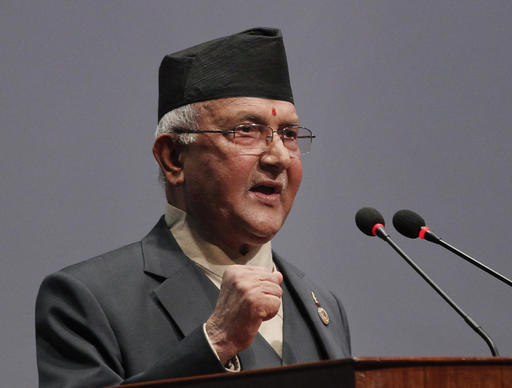Nepal’s prime minister resigns after losing majority support

In this Oct. 11, 2015 file photo, Nepal’s Khadga Prasad Oli addresses the parliament before being appointed as the new Prime Minister in Kathmandu, Nepal. Oli has resigned before facing a confidence vote in parliament that he expected to lose. AP
KATHMANDU, Nepal — Nepal’s prime minister resigned on Sunday shortly before he was to face a confidence vote in parliament that he expected to lose, further aggravating political instability in the Himalayan country.
Prime Minister Khadga Prasad Oli’s 9-month-old government had lost its majority support this month after the Maoist party pulled out of the coalition, accusing Oli of failing to honor power-sharing agreements.
In a nationally televised speech in parliament, Oli said Sunday that the way he was forced to resign would have far-reaching implications for the country and lead to further political instability.
“The opposition parties hatched a conspiracy for narrow interests, and I am stunned by that,” he said.
“I have already submitted my resignation letter to the president and have informed the speaker about the resignation, paving the way for the election of a new prime minister,” Oli said in the speech, which came an hour before the confidence vote was to be held.
A change in government is nothing new in Nepal, with Oli the eighth prime minister in the past 10 years.
Maoist party chairman Pushpa Kamal Dahal is now expected to try to form a new coalition government with the help of the Nepali Congress and some other groups.
The Maoists are former communist rebels who fought government troops for 10 years until they signed a peace agreement.
The Maoist party’s major complaint was that Oli’s government failed to take proper legislative action in favor of the Maoist cadres facing trials for wartime crimes.
The Maoists had launched a decade-long insurgency beginning in 1996 and joined the political mainstream after reaching a deal with the government in 2006. Alleged wartime crimes and human rights violations committed by the Maoists and the security forces have yet to be addressed.
The insurgency claimed the lives of more than 15,000 people and injured or displaced tens of thousands of others. TVJ














